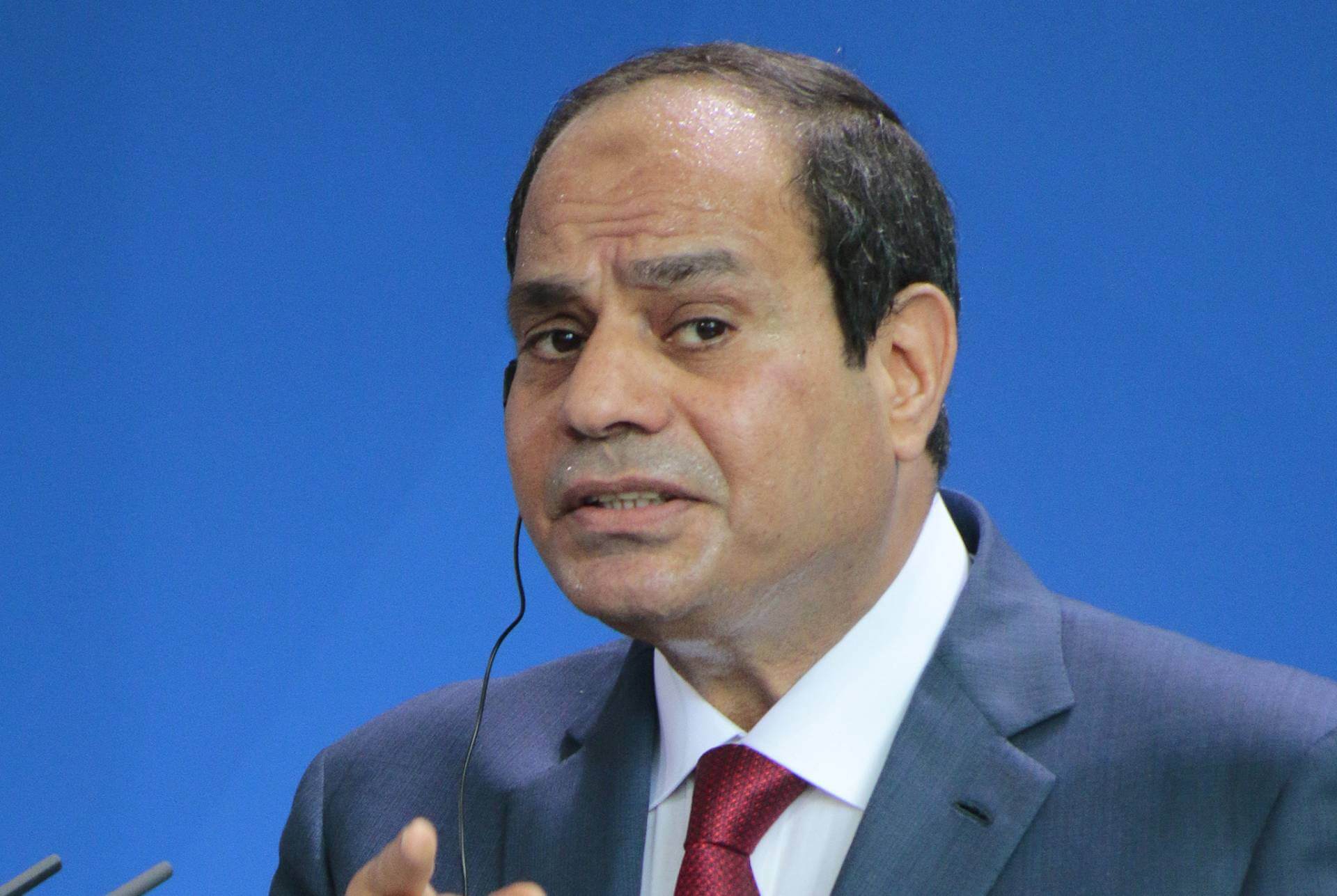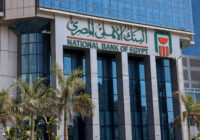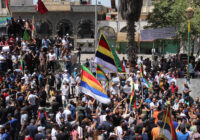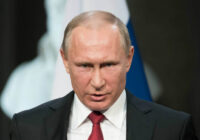The Gaza war has turned Palestine into a lightning rod for mounting frustration and discontent in Arab autocracies such as Egypt, Jordan, Tunisia, Algeria and Morocco.
Concerned that the war could mobilize segments of civil society, Saudi Arabia and the United Arab Emirates, where any form of public protest is banned, have cracked down on expressions of solidarity with Gaza, including the sporting of the keffiyeh, a checkered scarf that symbolizes Palestinian nationalism.
In December, pro-Palestinian activists at the COP28 climate summit in Dubai faced unprecedented restrictions, including prohibitions on flags and explicitly naming a country in news conferences, and scrutiny of their slogans. In January, the Red Sea Film Festival in Jeddah, the biggest film event in the Middle East and North Africa, welcomed Palestinian cinema but banned the donning of keffiyehs by attendees.
Egypt is feeling the economic pinch
Like in the second half of the 20th century, protests in the Middle East beyond the Gulf in support of Palestinians and against Israel’s assault on Gaza are as much about anger at governments’ faltering economic performance as they are about the war itself.
Nowhere is the anger more acute than in Egypt, where the country’s currency slipped this week sharply against the US dollar after the central bank raised its main interest rate by 600 basis points to 27.75% and said it would allow the currency’s exchange rate to be set by market forces. It was the Egyptian pound’s fifth devaluation in two years. Hard hit by the wars in Gaza and Ukraine, the government expected the measures to stymie Egypt’s 31% inflation rate, attract desperately needed foreign investment, and tackle its staggering shortage of foreign currency.
Egypt has suffered from a loss of tourism, significantly reduced Suez Canal shipping revenues because of Yemeni Houthi attacks on commercial vessels in the Red Sea, rising wheat prices in the wake of the Ukraine war and economic mismanagement, including investment in megaprojects such as a $58 billion new desert capital, as well as granting military-owned enterprises preferential treatment and an oversized stake in the economy.
The floating of the Egyptian pound secured an expansion from $3 billion to $8 billion of Egypt’s International Monetary Fund bailout loan, making the North African country one of the IMF’s highest borrowers.
The IMF agreement cemented a recent deal with the United Arab Emirates to develop a prime stretch of Egypt’s Mediterranean coast with a $35 billion investment over the next two months. Egypt will retain a 35% stake in the development with the Talaat Moustafa Group, a construction conglomerate involved in building the new capital as one of the beneficiaries. While not officially announced, well-placed sources said It was understood that the deal was contingent on Egypt reaching an agreement with the IMF.
Gulf states, including the United Arab Emirates (UAE), have in recent years backed away from pumping funds into black holes. Instead, they increasingly link investments in countries like Egypt and Pakistan to economic reforms and prospects for a return on investment.
The UAE pioneered the approach when it based a government minister in Cairo immediately after general-turned-president Abdel Fattah Al-Sisi’s 2013 UAE-backed coup that toppled Egypt’s first and only democratically elected president. The UAE official attempted to nudge Al-Sisi towards economic reform.
In a similar vein, Saudi Finance Minister Mohammed al-Jadaan told an investment conference last year, “We work with the International Monetary Fund and according to its rules. The days of unconditional assistance are over.”
Egypt walks a political tightrope
Last week, 45-year-old policeman Abdel-Gawad Muhammad al-Sahlamy was alone when he staged a one-man protest waving a Palestinian flag atop an advertisement billboard in the port city of Alexandria, but many Egyptians were likely to have been with him in spirit. Many are angry that Egypt’s Refah border crossing into Gaza remains closed despite the images of thousands of Gazans dying and imminent famine.
In October, the government sought to pre-empt potential protests by staging pro-Palestinian demonstrations of its own.
Al-Sisi believes that pro-Palestinian activists who were allowed to stage protests under former president Hosni Mubarak shifted their focus in 2011 to his regime and ultimately toppled him during the popular Arab uprisings. The revolts also led to the demise of autocratic rulers in Tunisia, Libya and Yemen and sparked mass anti-government demonstrations elsewhere in the Middle East.
To be sure, Egypt is worried that Israel’s destruction of Gaza is an effort to rid the Strip of its population by inducing Gazans to flee to Egypt. Officials in Cairo also fear that Hamas operatives could infiltrate the Sinai Peninsula where the military has been countering a low-level insurgency. Al-Sisi’s government is wary of Hamas because of its links to the Muslim Brotherhood.
Even so, many Egyptians resent the government’s close security ties with Israel and its support for a 17-year-long Israeli blockade of Gaza that has been tightened since the war. Egyptian resentment is compounded by reports that corrupt Egyptian government officials linked to the country’s intelligence service and a well-connected businessman who hails from the Sinai charge up to $7,500 per person for travel permits from Gaza to Egypt.
Al-Sahlamy shouted “God is Great” and denounced Al-Sisi as a “traitor and an agent” before being arrested by security forces. The Egyptian Network for Human Rights (ENHR) said Al-Sahlamy has not been heard from since.
The network quoted a friend of Al-Sahlamy as saying he was “breaking down” because of the war, which he described as “injustice.” Al-Sahlamy demanded that “the [Egyptian] borders [with Gaza] should be opened” to allow Gazans to escape the carnage, ENHR quoted the policeman’s friend as saying.
The IMF’s austerity program could push struggling Egyptians to a level of destitution not seen since the bread riots of 1977, despite the government’s insistence that it will put in place social protection measures to shield the most vulnerable.
The rising cost of basic goods has deepened the hardships faced by lower-class Egyptians. They have suffered from price hikes since the government embarked on an ambitious reform program in 2016 to overhaul the battered economy. Nearly 30% of Egyptians live in poverty, according to official figures.
For now, Egyptians, like others elsewhere in the Arab world, fear that uprisings would only enhance the chaos already gripping their part of the world. In Egypt’s case, “the question of Sisi’s future will arise when Egyptian citizens decide that they have nothing more to lose,” said Israeli journalist and Middle East analyst Zvi Bar’el. The same is true for much of the Middle East beyond the Gulf, with widespread public frustration at Arab states’ inability or unwillingness to alleviate Palestinian suffering as the joker in the pack.
The views expressed in this article are the author’s own and do not necessarily reflect Fair Observer’s editorial policy.
Support Fair Observer
We rely on your support for our independence, diversity and quality.
For more than 10 years, Fair Observer has been free, fair and independent. No billionaire owns us, no advertisers control us. We are a reader-supported nonprofit. Unlike many other publications, we keep our content free for readers regardless of where they live or whether they can afford to pay. We have no paywalls and no ads.
In the post-truth era of fake news, echo chambers and filter bubbles, we publish a plurality of perspectives from around the world. Anyone can publish with us, but everyone goes through a rigorous editorial process. So, you get fact-checked, well-reasoned content instead of noise.
We publish 2,500+ voices from 90+ countries. We also conduct education and training programs
on subjects ranging from digital media and journalism to writing and critical thinking. This
doesn’t come cheap. Servers, editors, trainers and web developers cost
money.
Please consider supporting us on a regular basis as a recurring donor or a
sustaining member.
Will you support FO’s journalism?
We rely on your support for our independence, diversity and quality.










Comment